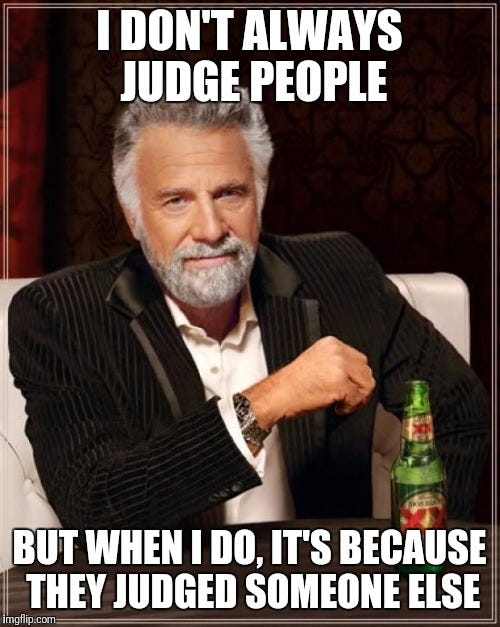1. The Invitation to Judge
Thanks to social media, it seems as though I’m constantly being invited to judge other people. Sometimes it’s a celebrity who has gotten in trouble or had a conflict with another celebrity, like Amber Heard & Johnny Depp. Other times, it’s an academic who has allegedly misbehaved. E.g., maybe they mentioned a bad word 30 years ago, like Nick Bostrom. Or maybe they divorced their spouse and married a student a dozen years ago, like Agnes Callard.
People proceed to post indignant messages on social media about how bad these people are. A comment thread ensues in which random people who don’t know the target weigh in—sometimes piling on, sometimes arguing the fine points of exactly what the target did wrong and exactly how it’s bad, or sometimes even defending the target’s basic decency. I often feel tempted to weigh in in these online tribunals and may have succumbed a few times.
Other times, I wonder what the hell we’re doing. Why would I be pontificating about this stranger’s moral character? And why would anyone listen to me? Sometimes, it strikes me as unattractive behavior, and I doubt whether I have the standing to be complaining about these people.
Why exactly would this be unattractive behavior? Is it immoral? Could morality somehow enjoin us from being overly moralistic?
2. What’s Crappy About Crappy Moralizing?
a. We don’t know what we’re talking about.
I have never met Amber Heard or Johnny Depp and know next to nothing about their character. Reading a few media puff pieces or hatchet jobs about them is not knowing them and is really quite worthless. So I should probably just shut up about them.
Imagine that someone is going to pass judgment on your character, and they’re going to do it based on reading a 2-page article written by some guy who never met you and was just trying to produce entertainment. Would you be happy with that? Would you think that person would be highly reliable?
If not, then why would you be able to judge other people in that way?
b. How about minding our own goddamn business?
If I actually do collect enough information to reliably judge Amber Heard, then there’s something else going wrong with me. What am I doing spending that much time reading about some stranger’s life? How am I thinking this is my business? It’s not; it’s just titillating gossip.
And what’s wrong with gossip? One problem may be that it shows small, primitive concerns. There’s a saying that great minds talk about ideas, mediocre minds talk about events, and small minds talk about people.
The drive to mind other people’s business is also a source of social conflict. People can be expected to disagree often about what actions are appropriate or inappropriate. This often causes conflict, which is inevitable when two people involved in an interaction with each other disagree about the morality of one person’s behavior. But there’s no need to spread the conflict by having people who have nothing to do with that interaction weighing in. If two conflicting parties need their dispute arbitrated, they should find an impartial arbitrator, and that arbitrator should investigate and make a judgment—and everyone else should mind their own goddamn business. Minding other people’s business is anti-social.
c. Piling on
Often, our moralizing amounts to piling on someone who is already being mobbed. In some cases, the target might deserve it; in most cases, they don’t. Even if the target is bad and did something wrong, the pleasure that one takes from joining a mob attack is gross. It is like the pleasure of beating up a child, or kicking someone when they’re down on the ground.
It’s not like these strangers have done anything to us so that we might be angry at them. It’s more like: we saw them on the ground, we saw that we could kick them without fear of getting hit back, so we took a shot.
d. The joy of superiority
Perhaps we like to moralize about other people because it makes us feel superior. We feel morally superior because we haven’t done whatever the target did, and though we may have done other crappy things, we don’t have to think about those at the moment. We assume a kind of superior social position, the position of the person handing out judgments, rather than getting judged. We don’t have to worry that anybody is going to start judging us, because we’re part of a giant crowd and no one in the crowd knows any of the shitty things we’ve done.
This is the cheapest way of feeling good about ourselves, because we don’t have to actually do anything difficult or produce anything of value.
3. The Need for Moralism
But wait. There are times when moralism is called for. Here are some.
a. When it’s your business
If someone appears to have mistreated you, it’s appropriate to try to figure out whether their action was right or wrong, so you can react appropriately. The same goes if you’re in some social position where you’re responsible for responding to wrongdoing—e.g., if you manage a work environment, you might have to judge employees’ behavior; if you’re an actual judge, you have to morally judge defendants before handing out sentences; etc.
b. Politicians
A good time for judging people’s character is when those people are running for public office, and therefore you’re in a position to decide whether they are fit to serve. Whether a political candidate is immoral is actually relevant to how you should vote, at least for many kinds of immorality. The above unsavory things could still be going on—we might be piling on and gaining an undeserved feeling of superiority—but it’s still necessary to discuss a politician’s character, in a way that we don’t need to discuss the character of random actors or professors.
c. Theoretically interesting cases
Sometimes, you can actually learn something of general interest by thinking about a particular person’s morality or immorality. Usually, you don’t; you just titillate yourself with gossip. But sometimes. Maybe the person faced an intriguing moral dilemma, and you’re trying to figure out whether they did the right thing (like, say, Sophie’s choice, if that were real). Maybe by figuring that out, you would shed light on our values, or the nature of morality, or something like that. In such cases, though, I think the general tone of the discussion would be a lot different from the usual self-righteous moralizing that goes on on social media.
Conclusion: It’s not always wrong to judge people, obviously. But we have a lot more crappy moralizing than we need.







A counter-argument is that gossip is a useful tool to:
1. Work through our moral theories using particular examples,
2. Perform self-analyses, and
3. Build social bonds.
We use third-parties as proxies because it's too difficult for most people to perform theoretical analyses in regards to point 1 and self-reflection in regards to point 2.
"Evidence" for point 2 is that gossip often involves projection.
I think we often think of gossip in regards to point 3 as a banal activity, and that's a great opportunity for a Far Side comic: https://i.pinimg.com/474x/98/fe/27/98fe27d86db47c9589c80b61d6057fbc--gary-larson-the-far-side.jpg
However, I think when a conversation involves points 1 and/or 2, then point 3 can be non-banal when the topic leads to profound discussions.
I think the harder question is private versus public gossiping. Based on the above, I think private gossiping is pretty great (although with some danger of the gossip getting out).
Public gossiping is trickier because people are essentially using the emotions and reputations of others. Nevertheless, the value is that when a discussion is public, very smart people can perform great analyses on point 1, so there can be a lot to learn. And for those that don't have many opportunities for private gossip, there are cathartic values in regard to points 2 and 3 when done in public.